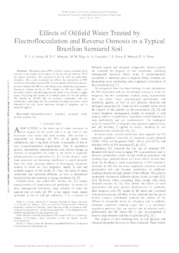Effects of oilfield water treated by electroflocculation and reverse osmosis in a typical brazilian semiarid soil.
Effects of oilfield water treated by electroflocculation and reverse osmosis in a typical brazilian semiarid soil.
Author(s): SOUZA, P. S. A.; MARQUES, M. R. C.; RIGO, M. M.; CERQUEIRA, A. A.; PAIVA, J. L.; MERÇON, F.; PEREZ, D. V.
Summary: Produced water (PW), which is water extracted along with oil, is the largest waste stream in the oil and gas industry. With the proper treatment, this wastewater can be used in agricultural irrigation. This study evaluated the effects the application of PW treated by electroflocculation (EF) and combined electroflocculationreverse osmosis (EF-RO) on soil salinity and sodification parameters. Excessive sodium levels in PW treated by EF may affect soil structural stability and plant growth, and tends to accumulate in upper layers, displacing the nutrient K to deeper layers of the soil profile. PW treated by EF-RO did not promote salinization and soil sodification, indicating that this combined technique may be a viable alternative for oily water treatment aiming at irrigation use in semiarid regions.
Publication year: 2019
Types of publication: Journal article
Unit: Embrapa Soils
Keywords: Irrigation, Irrigação, Osmose, Reverse osmosis, Soil, Solo, Wastewater, Águas Residuais
Observation
Some of Embrapa's publications are published as ePub files. To read them, use or download one of the following free software options to your computer or mobile device. Android: Google Play Books; IOS: iBooks; Windows and Linux: Calibre.
Access other publications
Access the Agricultural Research Database (BDPA) to consult Embrapa's full library collection and records.
Visit Embrapa Bookstore to purchase books and other publications sold by Embrapa.

